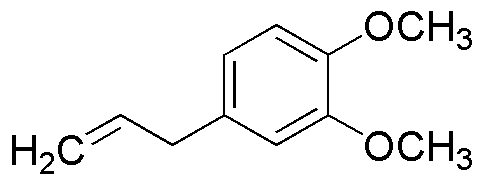Methyl eugenol is widely utilized in research focused on:
- Flavoring and Fragrance Industry: Commonly used as a natural flavoring agent in food products and as a fragrance component in perfumes and cosmetics, providing a sweet, spicy aroma.
- Aromatherapy: Employed in essential oils, it is valued for its calming properties, making it popular in aromatherapy practices to promote relaxation and reduce stress.
- Pest Control: Acts as a natural insect repellent, particularly effective against mosquitoes and other pests, offering an eco-friendly alternative to synthetic pesticides.
- Pharmaceuticals: Investigated for its potential therapeutic effects, including anti-inflammatory and analgesic properties, contributing to the development of new medicinal compounds.
- Research in Natural Products: Utilized in studies exploring the chemical properties and biological activities of plant-derived compounds, aiding in the discovery of new drugs and health products.
General Information
Properties
Safety and Regulations
Applications
Methyl eugenol is widely utilized in research focused on:
- Flavoring and Fragrance Industry: Commonly used as a natural flavoring agent in food products and as a fragrance component in perfumes and cosmetics, providing a sweet, spicy aroma.
- Aromatherapy: Employed in essential oils, it is valued for its calming properties, making it popular in aromatherapy practices to promote relaxation and reduce stress.
- Pest Control: Acts as a natural insect repellent, particularly effective against mosquitoes and other pests, offering an eco-friendly alternative to synthetic pesticides.
- Pharmaceuticals: Investigated for its potential therapeutic effects, including anti-inflammatory and analgesic properties, contributing to the development of new medicinal compounds.
- Research in Natural Products: Utilized in studies exploring the chemical properties and biological activities of plant-derived compounds, aiding in the discovery of new drugs and health products.
Documents
Safety Data Sheets (SDS)
The SDS provides comprehensive safety information on handling, storage, and disposal of the product.
Product Specification (PS)
The PS provides a comprehensive breakdown of the product’s properties, including chemical composition, physical state, purity, and storage requirements. It also details acceptable quality ranges and the product's intended applications.
Certificates of Analysis (COA)
Search for Certificates of Analysis (COA) by entering the products Lot Number. Lot and Batch Numbers can be found on a product’s label following the words ‘Lot’ or ‘Batch’.
Numéro de catalogue
Numéro de lot/série
Certificates Of Origin (COO)
This COO confirms the country where the product was manufactured, and also details the materials and components used in it and whether it is derived from natural, synthetic, or other specific sources. This certificate may be required for customs, trade, and regulatory compliance.
Numéro de catalogue
Numéro de lot/série
Safety Data Sheets (SDS)
The SDS provides comprehensive safety information on handling, storage, and disposal of the product.
DownloadProduct Specification (PS)
The PS provides a comprehensive breakdown of the product’s properties, including chemical composition, physical state, purity, and storage requirements. It also details acceptable quality ranges and the product's intended applications.
DownloadCertificates of Analysis (COA)
Search for Certificates of Analysis (COA) by entering the products Lot Number. Lot and Batch Numbers can be found on a product’s label following the words ‘Lot’ or ‘Batch’.
Numéro de catalogue
Numéro de lot/série
Certificates Of Origin (COO)
This COO confirms the country where the product was manufactured, and also details the materials and components used in it and whether it is derived from natural, synthetic, or other specific sources. This certificate may be required for customs, trade, and regulatory compliance.

